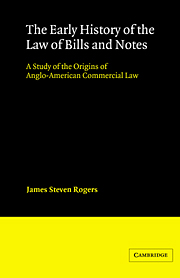 The Early History of the Law of Bills and Notes
The Early History of the Law of Bills and Notes Book contents
- Frontmatter
- Contents
- Preface
- Table of cases and precedents
- Note on citation
- Introduction
- 1 The central courts, commercial law, and the law merchant
- 2 Early exchange transactions: commercial practice
- 3 Early exchange transactions: private law
- 4 Early exchange transactions: public law and policy
- 5 From exchange transactions to bills of exchange: the transformation of commercial practice
- 6 The custom of merchants and the development of the law of bills
- 7 The civilians and the law of bills in the seventeenth century
- 8 Transferability and negotiability
- 9 The law of bills and notes in the eighteenth century
- 10 The problem of accommodation bills
- Conclusion
- Bibliography
- Index
4 - Early exchange transactions: public law and policy
Published online by Cambridge University Press: 22 September 2009
- Frontmatter
- Contents
- Preface
- Table of cases and precedents
- Note on citation
- Introduction
- 1 The central courts, commercial law, and the law merchant
- 2 Early exchange transactions: commercial practice
- 3 Early exchange transactions: private law
- 4 Early exchange transactions: public law and policy
- 5 From exchange transactions to bills of exchange: the transformation of commercial practice
- 6 The custom of merchants and the development of the law of bills
- 7 The civilians and the law of bills in the seventeenth century
- 8 Transferability and negotiability
- 9 The law of bills and notes in the eighteenth century
- 10 The problem of accommodation bills
- Conclusion
- Bibliography
- Index
Summary
The cases examined in the previous chapter suggest that from the fifteenth to the early seventeenth centuries various English courts enforced the monetary obligations that arose out of exchange contracts, but no special body of law had developed concerning bills of exchange. Indeed, it may even be stretching the imagination to speak of a law of exchange contracts prior to the seventeenth century, if that phrase is taken to suggest that disputes arising out of exchange contracts were governed by a special body of law distinguishing exchange contracts from other monetary engagements. Rather, the cases are most aptly described as applications to exchange transactions of general concepts and procedures for enforcement of simple monetary obligations.
Although exchange contracts and bills of exchange do not seem to have raised any special problems in this period from the standpoint of private law analysis, that is not to say that exchange dealings were regarded as wholly unproblematic. Quite the contrary, if we shift focus from private law to public law, we find that exchange transactions in particular, and commercial affairs in general, were the subject of intense public controversy in the sixteenth and early seventeenth centuries. A satisfactory account of the history of commercial law in general, and bills and notes in particular, requires careful consideration of the relationships between legal issues and controversies concerning economic policy and morality.
- Type
- Chapter
- Information
- The Early History of the Law of Bills and NotesA Study of the Origins of Anglo-American Commercial Law, pp. 69 - 93Publisher: Cambridge University PressPrint publication year: 1995


